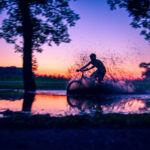Successful wedding photography requires planning and preparation. Follow these guidelines for each phase of the process, and you’ll be sure to capture some unforgettable moments that the couple will be able to hold on to forever.
The Discussion Phase
What are the expectations of the couple, and what are you willing or able to do? There are some ways to lead such conversation – either you can fit their requirements, or you can make them fit to your working style. If you know and like to do some specific kind of photography, then it will be better to do that instead of attempting an area where you have not mastered things.

Ceremony Details
As an example, I have a rather journalistic approach to photography. I don’t love flashes and soft boxes too much, or staging photos. So, I express my point of view regarding that from the beginning. I know I can do those journalistic-types of photos very well, and they are more natural, candid, and catch the overall feel of the event better. Staged photos and the use of artificial light sources tend to be more visually appealing, but lack in depth. They can just look like any other advertisements you see every day.

Bride and Groom
So, focus on doing what you know and like better instead of following trends. You will gain creativity and force, and perhaps master your own style better.
The Preparation Phase
You should know the exact event calendar. Hours, places. Make a timeline scheme and take some safety measures because, at weddings, there will always be things running late or early.
If you don’t already know the places where the events will happen, go visit them before the wedding day and get used to the lighting there. Take some photos in order to be prepared, and don’t get surprised. (I shot in a restaurant once where ISO 6400, 1/60 second, and f/1.4 was still underexposed, so you better be ready.)

Reception Hall
If you are not familiar with this type of event, you should have a list (at least in your mind) with the key moments that need to be captured. There are quite a lot, and good photos need to be made with every one of them. A few traditional ones include: preparations, rings, shoes, dress, buttons, bridesmaids helping the bride with the dress and veil, groom shaving, the groom seeing the bride dressed up for the first time, leaving home, entering church. Depending on their religion, the ceremony will also have some key moments. So, know what type of ceremony you will be attending beforehand. Some common religious moments include: taking communion, swearing faith, drinking wine, wearing crowns, kissing godfather’s hands, dancing around the table – the list can continue on, depending on what kind of traditions are followed during the wedding.

Groom with Crown
The Big Day
I like getting to the first venue before anyone else. Have a coffee with the couple, and meet guests and friends as they come by and start doing things. I always have the camera with me and take photos of everybody, even when they have just opened the entrance door. I do this, although it might be a bit intrusive, because I want everybody to get used to me before the big event starts to happen. So, by the time they are all dressed and leave home, everyone is so used to me being around that they just start to ignore me—which is my most important goal.

Wedding Reception
Some attitude tips to keep in mind: don’t talk too much. Don’t brag about what a nice picture you took—even if it helps build the confidence of the bride. Smile, be polite, take photos when asked—this will not ruin your artist career. To summarize, try to be neutral.

Candid Wedding Moment
Make sure to meet family (parents, brothers, sisters) and close friends of the couple early. They are important and need to be in your photos.
Some General Tips
- Stay focused, and keep an eye on everyone around. You should have photos of every key moment of the wedding, but candid photos, portraits, and general atmosphere photos have to be taken in the meantime.

Bride Details
- Always look at the background. Focusing in the distance and having the bride or groom in the foreground can look nice and will create a relationship between the subjects.
- Look at the parents. They tend to cry often, so if you focus on them and have the happy couple out of focus, it will create some contrast. Make sure not to leave the aperture wide open, as it can blur the newlyweds too much.
- Focus on catching expressions, not just framing the subject. Although I really admire composition, having a perfectly composed photo of a person doing nothing is less valuable than a fairly composed photo of a person doing something.

Wedding Band
- Know your gear and be ready for action, even if it starts raining. There is a saying, “You can tell a good photographer if you see him working in bad weather.” The advantage of not staging too much is that you can adapt to almost every situation. You can use weather to your advantage—or the advantage of your photos. You can either take cover in a nice shelter (if there are any around) or use umbrellas and make the rain a nice background for your story. Or, just follow the couple and shoot in plain rain with weather sealed cameras or protective covers. You must not see bad weather as a disadvantage, but rather as another setting for the story.
- Occasionally take part in the action—you are not a statue. This can make your photos more dynamic. I once got in a round dance, set the camera on self-timer and slow shutter speed, and made some really nice photos. But do not let yourself into the party too much, as this is not professional. Your goal is to tell the story the best way you can through the photos.

Bouquet
Wedding photography is hard. It demands knowing how to shoot various subjects – from objects and still life, to story illustration. To reiterate, first of all, you must communicate what you want and expect versus what you know how to do. This is valid for both the photographer and the couple. Be honest. Know your subject and venue. And if money is not such a great concern or pressure, you might skip some events that you know you won’t like to photograph. I know I’ll get blamed for this one. But it is better to like what you are doing—plus, the photos will most likely turn out better in the end.
About the Author:
Constantin Opris is a professional photographer based in Romania. Find his work at Dreamstime.com.
Like This Article?
Don't Miss The Next One!
Join over 100,000 photographers of all experience levels who receive our free photography tips and articles to stay current:







It helps when you say it is important to search for their projects in order to gather more information. My cousin told me last night that she and her boyfriend were planning to hire a wedding photographer and asked if I knew what the best ways to hire. Thanks to this informative article and I will be sure to tell them that it will be much better if they consult a professional wedding photographer as they are able to answer all their questions and they will surely give good memories of their wedding. I would love it if you can check out my Blogspot too. There are a lot of similar topics with different knowledge about the subject
I like how you said that focusing on the distance is a good idea when you’re photographing. My brother is getting married and he asked me to be in charge of photos. Should I hire a professional or try to do it myself?
You made a great point about how you should know the event calendar and how you can make a timeline scheme. My best friend is getting married next week and asked me to help her find the perfect photographer for her ceremonies. We will keep these tips in mind as we search for a professional that can fulfill all of her needs.
Thanks for sharing the best tips and yes, choosing a top wedding photographer can be daunting. But with the finding out about the various forms of wedding photography will help you make the right decision. What you say!!
In this day an age how many peolple rely on a wedding photographer to capture the day. I dont think I (or anyone else) have looked at my wedding photo album more than twice in 23 years and now everything is digital and on disc or memory stick so the role of the photographer is ever changing.
Great tips! Worth noting indeed! I agree to that saying, “You can tell a good photographer if you see him working in bad weather”, bad weather always measure the endurance and stamina of a photographer to rise above the challenges. Thanks for this suggestion – Focus on catching expressions, not just framing the subject, will keep this in mind.
It is very difficult to choose best photographer for your wedding as everyone want to get unique memory in the form of pictures to recall their D day in future. These tips really work for both wedding photographers and their customers.
Hi shraya sinha, yes I agree with your comment, so choosing the best photographers is very difficult in this modern world.
I found this article very informative and helpful. Photographs are indeed an important aspect as it helps to seize the memories. Liked the detailed information given here, thank you for sharing your thoughts!
Sorry but I find the title of this article immediately offensive. Sure, wedding photography, like any professional work takes a deal of preparation, effort and, in some cases, talent and empathy but for anyone to claim they ‘own’ a moment in time is surely arrogant?
The moments captured by a photographer, however talented, surely belong to the people concerned.
As a photographer, although I claim copyright of my images, I would never claim to ‘own’ them – shame on you for such attitude!